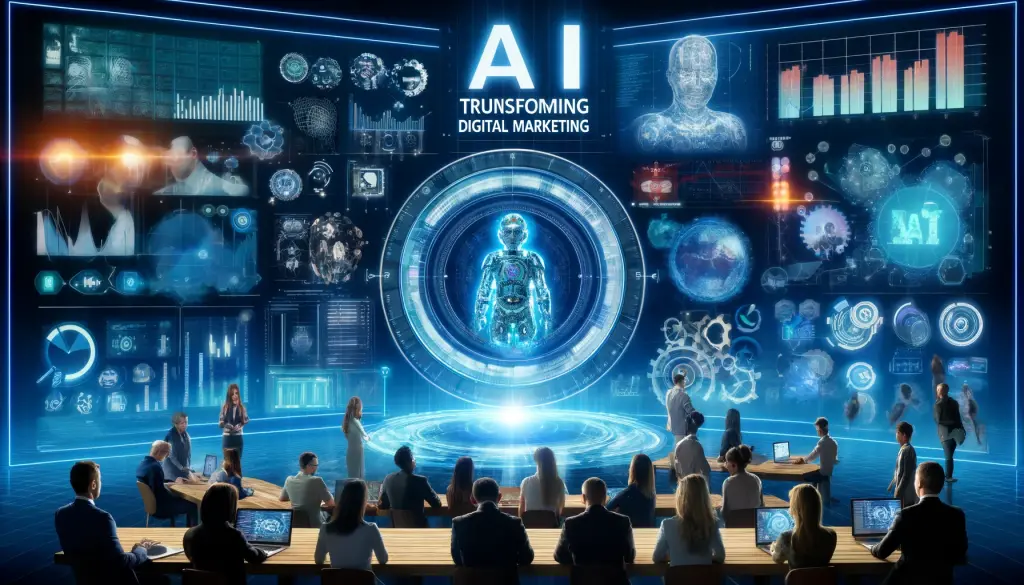The healthcare sector is experiencing an unprecedented demand for efficiency and effectiveness in its operations and management. As patient numbers increase and healthcare systems face mounting pressure to deliver high-quality care while managing costs, the need for innovative solutions has never been more critical. In this context, Artificial Intelligence (AI) emerges as a pivotal technology, offering transformative potential to revolutionize hospital management and operations.
AI in healthcare represents a paradigm shift, enabling hospitals and healthcare facilities to optimize processes, manage resources more effectively, and ultimately enhance patient care. Through predictive analytics, machine learning, and intelligent automation, AI technologies can streamline administrative tasks, improve decision-making, and facilitate a more patient-centered approach to healthcare services.
The integration of AI in hospital management encompasses a wide range of applications, from automating patient scheduling and optimizing staff assignments to enhancing diagnostic accuracy and personalizing treatment plans. This technological advancement not only promises to improve operational efficiencies but also to foster a more sustainable healthcare environment, where resources are utilized judiciously, and patient outcomes are prioritized.
As we delve into the specifics of how AI is being integrated into hospital management and its impact on various aspects of healthcare delivery, it’s clear that AI is not just a tool for innovation but a catalyst for redefining the very essence of healthcare efficiency and quality.
The Need for Efficiency in Healthcare
In today’s healthcare landscape, hospitals and medical institutions face a multitude of challenges that underscore the urgent need for increased efficiency in their operations. These challenges not only strain the resources of healthcare facilities but also significantly impact the quality of patient care and overall healthcare outcomes.
Challenges Faced by Hospitals
- Resource Constraints:
- Hospitals often operate under tight budgetary constraints, struggling to allocate resources effectively across various departments and services. This includes limitations in medical supplies, equipment, and personnel, which can hinder the ability to provide comprehensive care.
- Rising Patient Numbers:
- With aging populations and increasing prevalence of chronic diseases, hospitals are experiencing a surge in patient numbers. This rise in demand for healthcare services puts additional pressure on facilities, requiring them to manage larger patient loads without compromising care quality.
- Need for Cost-Effective Operations:
- In the face of economic pressures and funding limitations, hospitals must find ways to reduce costs while maintaining high standards of care. This includes minimizing waste, optimizing resource use, and improving process efficiencies.
Impact on Patient Care and Healthcare Outcomes
- Delayed Treatments and Longer Wait Times:
- Resource constraints and increased patient loads can lead to longer wait times and delayed treatments, adversely affecting patient satisfaction and health outcomes. In critical care scenarios, such delays can have significant repercussions.
- Strain on Healthcare Staff:
- The pressures of managing more patients with limited resources can lead to burnout and reduced job satisfaction among healthcare staff, potentially impacting their performance and the quality of care provided.
- Compromised Quality of Care:
- Inefficiencies in hospital management and operations can lead to compromised care quality, with risks of errors, inadequate patient monitoring, and suboptimal treatment outcomes.
- Financial Sustainability:
- Inefficient operations can strain a hospital’s financial sustainability, leading to cutbacks in services, reduction in workforce, or inability to invest in necessary technologies and facilities improvements.
To address these challenges, hospitals are increasingly turning to AI and other technological innovations. AI can play a crucial role in enhancing efficiency across various aspects of healthcare, from administrative tasks and patient flow management to clinical decision support and personalized patient care. By leveraging AI, healthcare facilities can not only mitigate the challenges associated with resource constraints and rising patient demands but also improve the quality and effectiveness of healthcare delivery.
Integrating AI in Hospital Management
Artificial Intelligence (AI) is being strategically integrated into hospital management systems to streamline operations, enhance efficiency, and improve patient care. This integration is transforming the way hospitals operate, from automating routine tasks to facilitating complex decision-making processes.
Integration of AI Technologies in Hospital Management Systems
- Automated Administrative Tasks:
- AI-driven systems can automate various administrative tasks, such as appointment scheduling, patient registration, and billing. These systems reduce manual workload, minimize errors, and improve operational efficiency.
- Enhanced Decision Support:
- AI algorithms provide advanced decision support for hospital management, offering insights into optimal resource allocation, financial planning, and operational strategies. This helps in making informed decisions that improve hospital performance and patient care.
- Seamless Integration with Existing Systems:
- AI technologies are often designed to integrate seamlessly with existing hospital management systems, including Electronic Health Records (EHR), Laboratory Information Systems (LIS), and Radiology Information Systems (RIS), enhancing their capabilities and providing a more holistic view of operations and patient care.
AI Applications in Various Hospital Operations
- Patient Scheduling:
- AI systems optimize patient scheduling by analyzing various factors, such as doctor availability, patient medical history, and urgency of care. This results in improved appointment management, reduced waiting times, and enhanced patient satisfaction.
- Staff Management:
- AI-powered tools assist in staff scheduling and management, ensuring optimal staff allocation based on workload, expertise, and availability. This not only improves operational efficiency but also helps in maintaining a balanced workload for healthcare providers.
- Inventory Control and Supply Chain Management:
- AI applications in inventory control analyze usage patterns and predict future needs, ensuring that medical supplies and equipment are adequately stocked. This prevents shortages or overstocking, optimizing inventory levels and reducing waste.
- Clinical Decision Support:
- In clinical settings, AI aids in decision-making by analyzing patient data to provide diagnostic suggestions, treatment options, and risk assessments. This support enhances the accuracy and effectiveness of clinical decisions, leading to better patient outcomes.
- Predictive Maintenance of Equipment:
- AI algorithms predict when hospital equipment requires maintenance or is likely to fail, allowing for proactive servicing. This predictive maintenance ensures that medical equipment is always in optimal working condition, reducing downtime and preventing potential disruptions in patient care.
By integrating AI into hospital management, healthcare facilities can achieve significant improvements in operational efficiency, resource utilization, and patient care delivery. The adaptability and learning capabilities of AI systems make them invaluable assets in the complex and dynamic environment of hospital management, setting the stage for more responsive, efficient, and patient-centered healthcare services.
Key Areas Impacted by AI in Hospital Management
Patient Care Coordination
- Optimization of Patient Flow and Treatment Schedules: AI enhances patient care coordination by optimizing patient flow and treatment schedules. It analyzes historical data and real-time inputs to predict patient volumes and allocate resources accordingly, minimizing wait times and ensuring timely care.
- Case Studies:
- A hospital in the United States implemented an AI system that analyzes emergency department workflows and predicts patient influx, allowing for better staff allocation and reduced patient waiting times, leading to improved patient satisfaction and outcomes.
Resource Allocation and Management
- Predictive Analytics for Resource Allocation: AI plays a crucial role in resource allocation by using predictive analytics to forecast the demand for medical supplies and manpower. It helps hospitals anticipate needs and make informed decisions on procurement and staffing, ensuring operational efficiency.
- Examples:
- A European hospital used AI-driven analytics to optimize its inventory management, significantly reducing waste and costs associated with overstocking and underutilization of medical supplies.
Staff Scheduling and Management
- Efficient Staff Schedules: AI contributes to creating efficient staff schedules by considering various factors such as workload, staff preferences, and qualifications. This ensures optimal staff utilization, maintaining a high level of patient care without overburdening healthcare providers.
- Benefits:
- The integration of AI in staff management has been shown to enhance work-life balance for healthcare workers, leading to better job satisfaction, reduced turnover rates, and a more stable care environment.
Medical Record and Data Management
- Improving Diagnostic Accuracy and Treatment Plans: AI-driven solutions in managing and analyzing medical records can significantly improve diagnostic accuracy and the formulation of treatment plans. By processing vast amounts of patient data, AI can uncover insights that assist in making more informed clinical decisions.
- Data Privacy and Security:
- AI systems are designed with robust protocols to ensure the privacy and security of patient data in hospital information systems. They can detect potential breaches and safeguard sensitive information, complying with legal and ethical standards.
In each of these key areas, AI not only streamlines hospital operations but also enhances the quality of patient care. Through the intelligent analysis of data and automation of routine tasks, AI allows hospitals to focus more on patient-centric care while maintaining efficiency and cost-effectiveness in their operations.
Challenges in Integrating AI into Hospital Management
The integration of Artificial Intelligence (AI) into hospital management, while beneficial, is fraught with various challenges that span technical, financial, and ethical domains. Additionally, skepticism and resistance to change within the healthcare sector can further complicate the adoption of AI technologies.
Technical Challenges
- Complexity of Implementation:
- Integrating AI into existing hospital systems can be technically complex, requiring significant changes to infrastructure and workflows. Ensuring compatibility between AI systems and legacy healthcare IT systems is a major technical hurdle.
- Data Integration and Quality:
- AI systems require large volumes of high-quality, standardized data to function effectively. Many hospitals struggle with integrating disparate data sources and ensuring the consistency, accuracy, and completeness of this data.
- Cybersecurity Risks:
- With the increased use of AI, hospitals face heightened cybersecurity risks. Protecting sensitive patient data against potential breaches in more complex AI-driven systems requires advanced security measures.
Financial Challenges
- High Costs of Adoption:
- The initial investment in AI technology, including hardware, software, and integration services, can be substantial. Hospitals must also consider ongoing expenses related to maintenance, updates, and training.
- ROI Uncertainty:
- There can be uncertainty about the return on investment (ROI) from AI initiatives. Balancing the costs with the expected improvements in efficiency, patient care, and financial outcomes is a significant financial challenge.
Ethical Challenges
- Patient Privacy and Data Use:
- The use of AI in hospitals raises concerns about patient privacy and the ethical use of patient data. Ensuring that AI systems adhere to strict privacy regulations and ethical standards is paramount.
- Algorithmic Bias:
- AI algorithms can inadvertently perpetuate biases present in their training data, leading to unfair or discriminatory treatment decisions. Addressing these biases and ensuring equitable patient care is an ethical imperative.
Skepticism and Resistance to Change
- Cultural Barriers:
- Resistance to change within the healthcare sector, particularly among staff who are accustomed to traditional practices, can impede the adoption of AI. Overcoming skepticism and building trust in AI systems is crucial.
- Training and Adaptation:
- There may be a lack of skills and understanding of AI technologies among healthcare professionals. Providing adequate training and support to facilitate the adaptation to new AI-driven processes is essential.
Future Prospects: AI in Hospital Management
The future of AI in hospital management is poised to be dynamic and transformative, with emerging technologies and innovations continually reshaping the healthcare landscape. Here’s a look into the potential future developments and the evolving role of AI in enhancing hospital operations and patient care.
Predictions for Emerging Technologies and Innovations
- Advanced Predictive Analytics:
- AI will see advancements in predictive analytics, enabling more accurate forecasting of patient admissions, disease outbreaks, and resource needs. This will allow hospitals to prepare and respond proactively, ensuring optimal resource allocation and patient care.
- Robotics and Automation:
- The integration of AI with robotics in hospital settings is expected to increase, performing tasks ranging from automated disinfection and medication dispensing to assisting in surgeries, thereby improving efficiency and patient safety.
- Natural Language Processing (NLP):
- NLP technologies will become more sophisticated, enhancing their ability to interpret and process human language in clinical documentation and patient interactions. This will streamline administrative tasks and improve the accuracy of clinical data analysis.
- Interoperable AI Systems:
- The development of interoperable AI systems that can seamlessly integrate with various healthcare technologies and platforms will facilitate a more cohesive and efficient healthcare ecosystem.
- AI-Enhanced Medical Imaging:
- AI’s role in medical imaging will expand, with more advanced algorithms improving the accuracy and speed of image analysis, aiding in early disease detection and personalized treatment planning.
The Evolving Role of AI in Personalized Medicine and Integrated Healthcare Services
- Personalized Patient Care:
- AI will increasingly support personalized medicine, analyzing patient data to tailor treatment plans to individual health profiles, genetic information, and lifestyle factors, thereby improving treatment outcomes and patient satisfaction.
- Integrated Care Delivery:
- AI will play a crucial role in integrating various aspects of patient care, from primary care to specialty services, ensuring a coordinated approach that enhances the overall quality of care and patient outcomes.
- Remote Patient Monitoring:
- With advancements in AI and IoT, remote patient monitoring will become more prevalent, allowing for continuous assessment of patient health outside of traditional hospital settings, improving chronic disease management and reducing hospital readmissions.
- Enhanced Patient Engagement:
- AI-driven platforms will facilitate better patient engagement by providing personalized health information, reminders, and support, empowering patients in their healthcare journey and improving adherence to treatment plans.
- Learning Health Systems:
- Hospitals will evolve into learning health systems where AI continuously analyzes data from various sources to improve healthcare processes and outcomes, creating a cycle of continuous learning and improvement.
The future of AI in hospital management is bright, with the potential to revolutionize every aspect of healthcare delivery. By embracing these emerging technologies and innovations, hospitals can significantly enhance their operational efficiency, provide more personalized and integrated care, and ultimately achieve better healthcare outcomes.
Conclusion
In conclusion, the integration of Artificial Intelligence (AI) in hospital management signifies a major leap forward in the healthcare industry. As AI technologies continue to evolve and mature, they offer immense potential to revolutionize hospital operations, enhance patient care, and streamline administrative processes. The journey towards fully integrating AI into hospital management is complex and challenging, yet the rewards are substantial, promising a future where healthcare is more efficient, personalized, and accessible.
The future prospects of AI in hospital management are not just limited to operational efficiencies but extend to the transformative impact on personalized medicine and integrated healthcare services. As AI becomes more ingrained in the healthcare sector, its role in supporting personalized treatment plans, improving patient outcomes, and facilitating seamless care coordination will become increasingly prominent.
To fully harness the potential of AI, hospitals and healthcare providers must navigate the technical, financial, and ethical challenges associated with its integration. This involves investing in the right technologies, training staff, ensuring ethical use of AI, and continuously adapting to the evolving digital landscape.
In sum, AI in hospital management is more than a technological trend; it’s a paradigm shift towards a more data-driven, patient-centric approach to healthcare. As we look to the future, continuous innovation, collaboration, and a commitment to ethical practices will be key to unlocking the full potential of AI in transforming hospital management and the wider healthcare ecosystem.





